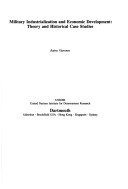UNIDIR S.
1 total work
This book develops a framework for the analysis of the relationship between arms production and economic development in different types of economies and international conditions. Technological and organizational factors are taken into account. The case studies include Japan and Great Britain before World War I and Brazil and the USA after World War II. The main finding of the book is that the nature of the relationship, whether positive or negative, between military industrialization and economic development is context-dependent. In the rising powers the relationship tends to be positive and in the declining powers, negative. The establishment of a viable capital-goods industry and the constructive intervention of state are necessary preconditions for the military industrialization and its positive spin-off effects. A period of accelerated growth in the world economy facilitates the operation of such a spin-off mechanism. While the relationship of arms production and economic development in declining powers is necessarily complex, it tends to be negative. The basic character of military R&D and procurement means that they become self-inflicted burdens on the nation's economy.
It becomes separated from the international civilian market and its competitive pressures, thus depriving it of the dynamic factors of growth.
It becomes separated from the international civilian market and its competitive pressures, thus depriving it of the dynamic factors of growth.
